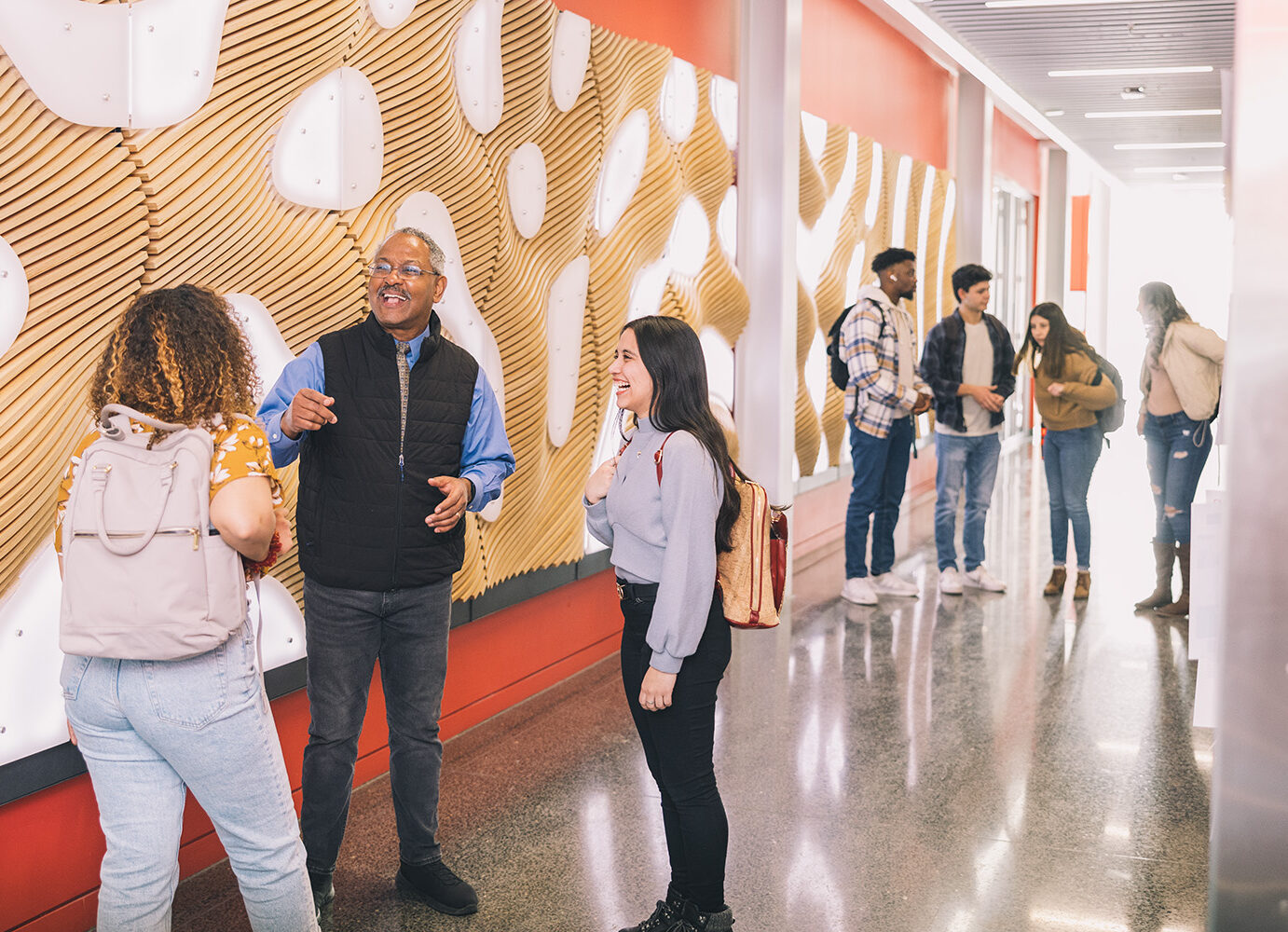
Background
The Advising Success Network (ASN) is excited to accept applications for the 2024-2025 Advising Success Network Cohort! The ASN Cohort is supported by Lumina Foundation and provides a collaborative community of practice for institutions interested in working with colleagues across other institutions and national experts to advance their advising practices and policies through holistic advising redesign. Our goal is to collaboratively partner with three two-year institutions and three four-year institutions to engage in an 18-month supported learning experience.
This opportunity provides participating institutions with access to national networks, opportunities to present, and dedicated time to learn in communities of practice and receive expert guidance in areas like understanding the unique skills, talents, aspirations and needs of a student population, utilizing advising technologies, establishing leadership commitment, and providing relevant and meaningful staff and faculty professional development opportunities.
Why Should Your Institution Apply?
We are seeking six institutions that serve significant populations of Black, Latinx/a/o, Indigenous, Asian American, Pacific Islander, poverty-affected students, students over the age of 25, and/or identify as a Minority Serving Institution. Selected institutions receive:
- A one-time $3,000 subgrant.
- A free, guided self-assessment to identify learning opportunities within and across institutions.
- $50,000 worth of complimentary virtual expert guidance. Participating institutions will be provided with one year of jointly-developed materials, workshops, and supports from ATD, NACADA: The Global Community for Academic Advising, American Association of State Colleges and Universities (AASCU), EDUCAUSE, and The National Resource Center for The First-Year Experience and Students in Transition. These materials and resources were developed with input from institutions nation-wide, provided to over 150 institutions, and are valued at $50,000 per institution.
- NASPA will cover registration, hotel costs and travel costs for two individuals from each cohort institution to travel to and present their work at a national conference. Prior institutional cohort leads presented their successes at NASPA’s Student Success in Higher Education Conference in June.
- Facilitated lunch during monthly meetings. NASPA will provide teams with support for a monthly lunch meeting accompanying the expert guidance listed above.
- Access to national networks of student success professionals and advising champions committed to utilizing advising as a lever for equity and justice supporting Black, Latinx/a/o, Indigenous, Asian, Pacific Islander students, and poverty affected students.
- Access to a learning community of other institutions with shared learning opportunities and dedicated, facilitated time to learn within and across institutional teams. The cohort will engage in conversations around equity and justice to include systemic issues perpetuated by race/ethnicity, class/status, income, and intersectional student identities. This experience will also involve reflecting on institutional policies, practices, and outcomes and the role the institution plays in supporting and hindering student success.
- A case study detailing and celebrating institutional strengths and ongoing work, which will be shared through NASPA and ASN partner communications channels.
- Additionally, there may be an opportunity for cohort members to receive travel support to convene for one in-person meeting.

Application Process
Applications are now closed. Our selection committee will review all applications and notify selected institutions by mid-December. Please contact [email protected] with any questions.

2022-2023 Cohort
The inaugural ASN cohort operated from June of 2022 to June of 2023 and included Claflin University, Coastal Bend Community College, College of Southern Maryland, Hinds Community College, Lincoln University, and Saginaw Chippewa Tribal College. These institutions met monthly to advance their advising related to equitable student success & Guided Pathways implementation, creating opportunities for more cross-functional collaboration, including the integration of financial aid, academic advising, and career advising, review existing advising-related policies and communicating the vision, mission, and goals of advising institution-wide. In addition to working together, these institutions engaged in learning opportunities provided by national experts and presented their successes at NASPA’s Student Success in Higher Education Conference.
Timeline & Activities
Institutions will identify an advising champion to serve as a main point of contact to build a campus team and engage in planning and logistics. This person could be an advising staff person or an individual who has direct contact with advising administration. The desired core team of institutional members that may vary depending on the focus of each service, but will likely include faculty, staff, leadership, institutional research (if applicable), and information technology. The Advising Success Network team will provide support and guidance (if desired) in the selection of teams.
Participation in the cohort will begin from January 2024 through April 2025. The experience will be collaboratively developed, but will include:
- November 6, 2023: Applications due
- December 2023: A virtual kick-off event with teams from all selected institutions to introduce the Advising Success Network national experts, celebrate institutional successes, and develop common learning goals
- January – February 2024: Each institutional team will engage in a guided self-assessment administered by the Advising Success Network to determine advising strengths and shared areas of improvement and learning across the cohort. This assessment will not require student-level data and will ask broad questions about advising structures and policies. This information will be used to highlight key promising practices.
- March 2024: The cohort will meet virtually to co-develop a plan with the ASN about priority areas of focus during the experience that are aligned with the self-assessment results. ASN experts who are delivering the tailored supports will also be part of the discussion and will offer deeper insight into what each offering entails.
- April 2024-April 2025:
- Participation will include up to 5 hours per month of engagements which will typically include virtual meetings and asynchronous activities, with occasional pauses with respect to academic calendars and typically high-volume advising times of the year. An additional 2-3 hours per month may be required of the main point of contact for planning purposes.
- These meetings will include a mix of individual check-ins, cohort-wide engagement opportunities, and the delivery of customized supports aligned with the priority areas of focus identified through the self-assessment.
- Participating institutions will have the opportunity to engage with each other and collaborate outside of meeting times through access to a cohort-wide communication platform provided by the ASN.
- At the culmination of the cohort experience, institutions will share knowledge and ideas through interviews with the ASN, which will inform written case studies at the conclusion of the cohort experience to document key insights and lessons learned.
- At some point during or shortly after the cohort experience, the ASN will provide monetary support (hotel, travel, conference fees) for an in-person cohort gathering, in addition to two individuals per institution to attend an Advising Success Network affiliated conference to present on their work.

Selection Criteria
Institutions that meet the following criteria will be strongly considered for their participation in this cohort:
- Institutions that serve significant populations of Black, Latinx/a/o, Indigenous, Asian American, Pacific Islander, poverty-affected students, students over the age of 25, and/or identify as a Historically Black College or University, Historically Black Community College, Predominantly Black Institution, Hispanic Serving Institution, Tribal College or University, Native American Serving Non-Tribal Institution, Asian American and Native American Pacific Islander-Serving Institution, Native Hawaiian Serving Institution, Alaska Native Serving Institution.
- Institutions committed towards advising redesign and are interested in leveraging learnings from the cohort experience to advance efforts.
- Capacity and willingness to consistently and actively participate in the cohort experience, as outlined in the Timeline & Activities section above.
- Willingness to reflect upon institutional policies, practices, and outcomes and the role the institution plays in supporting and hindering student success
- Prioritization of advising redesign efforts have some degree of alignment with the possible services available as part of the ASN cohort experience.
Advising Success Network Support Areas
The available ASN support areas are categorized into the six areas. Participating cohort institutions will collaborate with the Advising Success Network team to prioritized areas of shared learning. Workshops and materials associated with each area were developed by NACADA: The Global Community for Academic Advising, The American Association of State Colleges and Universities, Achieving the Dream, The National Resource Center for the First-Year Experience and Students in Transition, and EDUCAUSE.
The audience for this topic includes senior leaders like Presidents, Provosts, and Vice Presidents.
Activities include:
- Exploring the Campus Landscape: Create a map to illustrate the key indicators of sense of belonging within the academic community of practice
- Managing Mindsets for Change: Apply change management and adaptive skills when engaging stakeholders
- (Re)Envisioning Advising Redesign: Establish or (re)establish a holistic advising vision aligned to the strategic plan; Create internal communication strategies to establish buy-in and trust in advising redesign process
- Resourcing Advising Redesign: Create a map of existing resources related to the current advising infrastructure; Identify resource-specific needs to embed in an advising strategic plan
This topic is designed for a cross-functional team inclusive of Directors, Assistant Vice Presidents, and other advising leaders, and primary and faculty advisors.
Activities include:
- Core Components of Holistic Advising: Develop an operational definition of holistic advising
- Understanding Racial and Socioeconomic in Advising: Define equity in advising for the institution’s specific student population and draft equity-centered language for college-wide definitions and advising systems
- Understanding Your Student Population: Examine student groups through an equity lens and use design thinking to engage in student support program design
- Working Towards Your Ideal Advising State: Define the ideal advising model and start to make plans to achieve this ideal
- Understanding the Student Journey: Understand and apply student journey mapping
- Designing a Professional Development Plan for Student Success Professionals: Create a scalable professional development plan to support the work of student success
- Advising System Architecture - Integrating Career Advising: Identify how/where advisor competencies can be demonstrated in the career advising process and develop an action plan to address racial and socioeconomic inequities within advising system architecture
- Process Mapping: Building a process map that reflects the current state and create a redesigned future state of the advising process
This topic is designed for a cross-functional team inclusive of Directors, Assistant Vice Presidents, and other advising leaders, and primary and faculty advisors.
Activities include:
- Aligning Core Components of Holistic Advising with Roles and Responsibilities: Produce an inventory of student support programs, examining the characteristics of connections between those programs and create an action plan to integrate student success initiatives
- Cross-Team Collaboration: Institutions identify key stakeholders in systemic redesign, the roles they can play, and strategies for them to work collaboratively
This topic is designed for a cross-functional team inclusive of Directors, Assistant Vice Presidents, and other advising leaders, IT and IR leaders, and primary and faculty advisors.
Activities include:
- Preparing to Purchase Advising Technology: Identify key stakeholders and consider common reasons for resistance and share best practices for engaging resistors to build buy-in earlier in the process
- Navigating the Advising Technology Landscape: Audit existing knowledge and resources (particularly availability of staff and staff capacity for this work) to ensure that a diversity of perspectives and strong cross-functional team is included in the procurement and implementation process
- Scaling Technology: Identify and communicate stakeholders of tech systems on campus; learn the best practices of how to train campus users on tech systems; understand the needs for maintaining and reviewing the tech systems
- Equity in Technology: Develop an action plan to work toward a just integration of an advising technology
This topic is designed for a cross-functional team inclusive of Directors, Assistant Vice Presidents, and other advising leaders, IT and IR leaders, and primary and faculty advisors.
Activities include:
- Key Components of Advising Program Evaluation: A framework to evaluate the effectiveness of current advising programs that includes the use of a broad range of disaggregated data, analysis of equity gaps, and leading indicators
- Assessment & Advising Program Evaluation: Establishing Goals, Outcomes, Metrics: Create a set of learning outcomes to define measurable goals, intended outcomes, and metrics of advising at the institution
- Evaluation Framework and Design: Develop a mindset that embraces the application of program evaluation data and insights to inform improvements to advising systems and structures
The audience for this topic includes primary and faculty advisors.
Activities include:
- Elements: Data Oriented Mindset and Systems: Develop definitions for data-informed culture and decision-making that intentionally center equity
- Academic Advising and Your Identity: Develop an understanding between the intersection of identity and belonging

Interested in learning more?
Contact: [email protected]
Elise Newkirk-Kotfila | Assistant Vice President for Strategy and Partnerships
NASPA
Alexa Chamberlain | Director of Research and Strategy
NASPA


